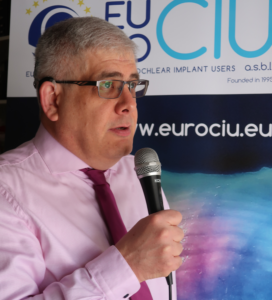More lobbying and engagement by and for cochlear implant users
Robert Mandara, Vice President of the European Association of Cochlear Implant Users (EURO-CIU) and himself a bilateral CI user, called on all CI users for more health policy engagement on their own behalf at the EURO-CIU 2022 General Assembly in Rotterdam. A short summary of his speech.

We rightly complain that access to cochlear implants and processor upgrades is not good enough, that newborn hearing screening should have been available everywhere by now, and more. But we are also our own advocates, the lawyers, the lobbyists for our own causes! Our success depends on how forcefully we represent our own concerns.
CI manufacturers cannot do this credibly; researchers and clinicians do not have as much influence as one might hope. Because we, as users and as their family members, are closest to the issue, we are in the best position to talk about it.
Every time we are seen with our CIs, we thereby automatically raise awareness of cochlear implants in the general public. And when we act together in a large association, we can raise our voices much louder than a single person can.
Enthusiasm for cochlear implants is not universal
Before making important decisions, people should weigh all their options. CI candidates should do the same. Some then have contact with deaf people, some of whom are fundamentally against hearing technology and CIs; who then argue very convincingly - and thus persuasively - even if this does not make the arguments any more correct.
During the pandemic, the availability of sign language on television was increased. This has brought the culturally deaf group into focus. We need more role models with CIs on TV now, as well as honest reporting about CIs, to achieve some balance here.
Some hearing aid manufacturers and hearing care professionals also have a financial interest in their clients not being implanted.
We sometimes argue against ourselves!
It is important that we ensure good outcomes for all CI users. After all, when some of us talk about their "bad" listening successes, it is perceived more clearly than the "good" listening successes of the satisfied majority. Horrible news carries disproportionate weight!
In other ways, too, we must choose our words carefully. Thus, I admonish you all to always speak of cochlear implants in the plural. "The CI" would be like speaking henceforth only of "monocle" instead of "eyeglasses"! Every time "one CI" is mentioned, it reinforces the idea that one CI is enough. But in most cases bilateral implantation is better!
And let's finally stop discussing the cost of cochlear implantation. The follow-up costs of deafness without implant are much higher. Cochlear implants are an investment with an estimated return of ten to one according to current data. Conversely, the value of implants to their users is incalculable. If a country can afford not to implant, then it can definitely afford to implant! Failing to make this investment destroys lives and affects families and society in general.
No other part of health care has to prove it is profitable - then why CI?! Cochlear implantation is an incredible investment opportunity; there is no better time to invest than now!
CI care is deteriorating - also in Europe
Since the cochlear implant became available about 30 years ago, about one million people have received such an implant, about 250,000 of them in Europe. This may sound like a great success, but it is not! Today, for every 20 people who would need a CI, only one is implanted! And the number of CI candidates is growing faster than the number of implanted.
These numbers are estimates, but no matter which estimate you might trust more: The result is always equally shocking. If it took 30 years for five percent of CI candidates to actually get a CI, and if it continues at that pace, it will take another 570 years to make it possible for the rest. 570 years is not a waiting list, you won't be alive to see your implantation!
If the treatment of an incurable disease were affordable for us, would we allow the death of 95 percent of those affected? First and foremost, we have to fight to reduce this waiting time of 570 years to an acceptable and realistic level. Implantation alone does not eliminate all our problems, but a higher number of CI users brings more social weight.
Key factors: availability, awareness and lifelong care!
Let's not get too distracted by those problems that affect all hearing impaired people. We need to be very specific in convincing ministries of health, governments, politicians and clinics to build the necessary funding and infrastructure for adequate CI services. Medical professionals need to recognize how well cochlear implants work. The general public needs to know that cochlear implants do not work as primitively as some media portray them. In fact, this negative image causes many CI candidates to be afraid of implantation. People can change their critical opinion, but it takes time. For me, it took 18 years to change my mind!
The European umbrella organization EURO-CIU wants to use its network and contacts to support the country organizations in their work. Naturally, none of us is a trained advocate and lobbyist, however, as we all know, big steps consist of many small steps. Let's start with small activities, for example on social media. Let's learn from each other. And last but not least, let's engage our youth.
 "Let's learn from each other! And last but not least - let's involve our youth!"
"Let's learn from each other! And last but not least - let's involve our youth!"
©Robert Mandara
Young CI users are a huge potential!
Young CI users have fantastic communication skills. Yet we miss them in most CI organizations. Either we haven't prepared young people enough to stand up for their own rights and needs; or they are doing so well with implants that they simply aren't angry enough about the problems. If they're doing so well, that's great. But they need to understand how privileged they are; and that it is their social responsibility to help those who, as mentioned, will otherwise have to wait another 570 years for those privileges. Also in their own interest: When new treatments or technologies become possible, they themselves may then have to take a back seat again.
We will never have solved all the problems, the challenges will only change. Perhaps one day cochlear implants will be replaced by a better solution. But lobbying for CI users will remain important as long as one very last CI user is alive. Define their goals, pursue them, and celebrate every big and small success!







